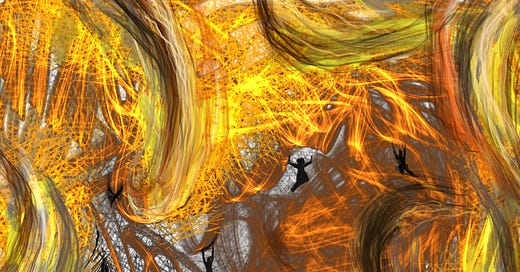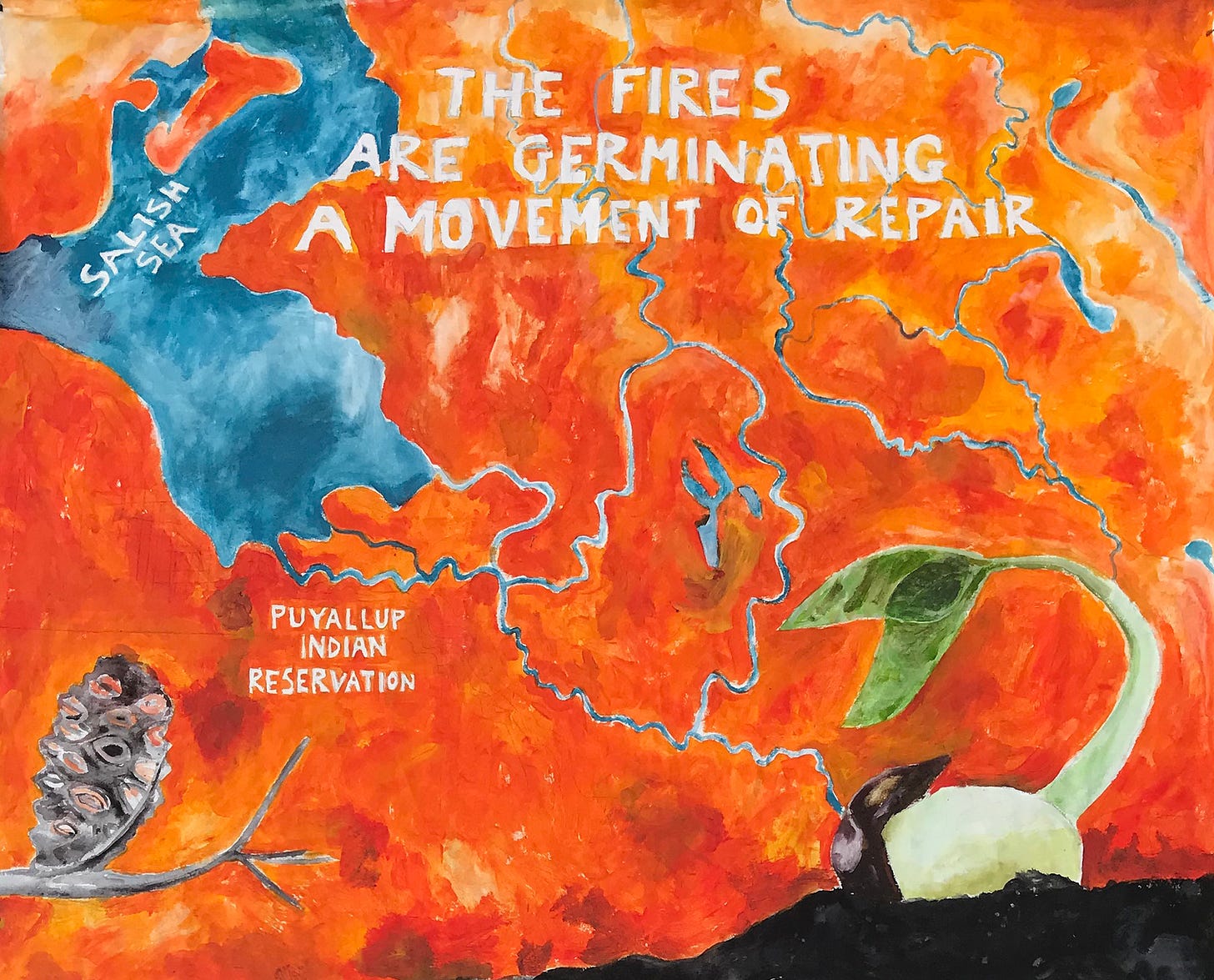As I jump continual hurdles in completing the first draft of the book, self-doubts have arrived, seemingly at random, crowding into my psyche in the middle of the night. It’s not fun, but I know it is pretty typical to expect this challenge when gestating something big in the midst of many crises. Perhaps the process of deconstructing these occasional blockages can act as a spell to undo the knots for others as well. Consider today’s sharing a kind of mutual aid; medicine to be found in the ashes of this time.
Somewhere inside the crowds of my inner naysayers, there’s a core self that sees the merit in what I’m writing and is willing to submit to the magic of the keyboard under my fingertips everyday. Sometimes I’m just slicing away paragraphs that got too bogged down or I fine tune a few sentences. There are days when I arrive at my desk like a zombie; the plague of another sleepless night leaving its brain fog like a snail’s sticky trail. Still I attempt to locate one of the tendrils of thoughts, find a phrase to match, recalibrating my nervous system as best I can.
When an inner conversation starts to flow into terrain that I had not imagined entering, I know I’m in alignment with the complexity of this moment, playing along the edges with word magic. Getting to that place takes patience and self-compassion. When I find that the process of writing becomes too self-conscious and plodding, I remind myself to pause and do something else. There’s always something else to prepare, cook up, organize, and untangle elsewhere. Sometimes just getting the blood flowing is enough to move the log (or word) jam.
Still, it important to acknowledge that walking into the unknown can be terrifying, if not paralyzing. It’s the fear of the blank canvas or page that can create inertia even in the best risk takers. If we get caught up looking for ways to control things (i.e. structures that will supposedly make everything turn out perfectly) we can freeze and do nothing. We can look around for guidance, a map, a walking stick, but ultimately, it’s crucial to remind ourselves that we’re in a body and that the breath can take us back to some semblance of center. Once we’ve given the breath some attention, we can go outside and talk to a tree or a bird, or just listen to the wind. Then we can hopefully move forward with some trust, and make those marks, stumble into our phrases, and take an action, plunge into the mess.

The writing of this current book, unlike my last one with its slam-dunk, nine-month gestation process, has felt like a lot of stumbling and plunging. Much of this is derived from the constant interruptions of caregiving as well as my own eminently distractible mind, moving from one screen to another. Yet, this desire to be distracted also comes from riding waves of uncertainty on a daily basis, and it seems that much of the collective is caught up in these seas (except for those in deep denial - how is that possible?). Unfortunately, many are responding in reactionary ways, turning to fascist or fundamentalist tropes and behaviors. At the same time, there are, thankfully, more than a few who recognize that navigating change with buoyancy and imagination is necessary if we’re going to survive as a species. Some of the latter group are responding with curiosity to the profound shifts, planting their visions in a multiplicity of forms and contexts. I will be revealing a few of those folks in the book.
Ashes are everywhere we look, but we need to remember that the fires of this time are also germinating seeds and ashes provide nutrition. I see the readers of this forthcoming book as some of those seeds. Please let me know if you see yourself as a member of any of these groups below.
1. people who have tapped into their creative voices who are not attracted to the commodity art world or who want to leave its spiritual bankruptcy to find more ancestral roots to ground their work.
2. younger artists who are carrying enormous debt, are so exhausted by their day jobs that they can barely create, and are alienated by the field in which they were trained.
3. cultural activists who want to strengthen the processes they use within communities who are informed by transformative justice and participatory democracy.
4. healers who recognize we will not move forward as a society unless trauma is recognized and processed both artfully and somatically.
5. storytellers and archivists who see the urgency of documenting local community knowledge and sharing it across generations.
6. ecological and racial justice activists who recognize that their work will be enhanced by bringing in the creative imagination of the community.
7. people who need to express all the rage, grief, fear, and despair clinging to their spirits so that they can find gratitude and ways to celebrate amid the chaos of this time.
As we move forward into this time of so many unknowns, we need to be reminded that things can turn on a dime, and change is the only thing we can truly count on besides gravity and the earth’s rotation. Thank you, Octavia Butler, who artfully reminded me of that fact a long, long time ago! And adrienne maree brown and her sister, Autumn, with your multiple podcasts, and all the folks at the Emergent Strategy Ideation Institute who remind me of all the incredible folks doing creative activism that keeps building beauty, justice, and equity in the cracks. Yes, there’s lots to be done in this time, but don’t forget to rest; it’s one of the most crucial emergent strategies and Tricia Hersey tells us why:




I love the depth of your reflections. Thank you for your word magic.